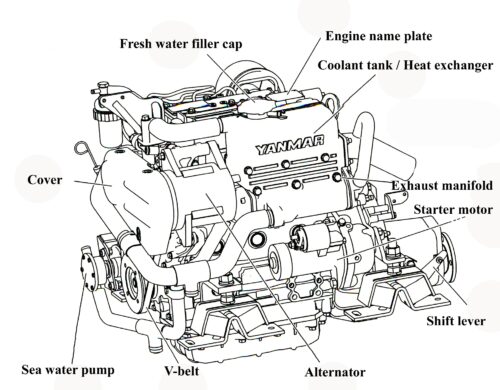Understand and know how to maintain the diesel engine aboard your boat with these explainations and suggestions from Amanda Swan, Great Escape Sailing instructor.
What does a diesel engine do?
Converts diesel fuel to energy: torque and electricity.
6 Systems of a Diesel Engine – similarities to the body
1. Fuel system – food
2. Electrical – brain
3. Cooling system – hydration, sweating
4. Lubricating system – blood stream
5. Air – breathing
6. Transmission – movement
1. Fuel System
- Inspect and clean tanks.
- Install fuel tank sump pump.
- Pre-filter fuel if questionable, consider adding biocide/algaecide: Biobor JF or Star Brite.
- Lift pump brings the fuel from the tank to the fuel filter.
- Injection pump pressurizes the fuel and sends it to the injectors.
- Injectors spray the fuel into the cylinders at the right moment.
- BANG! The fuel/air mixture explodes due to compression.
- High pressure common rail engine vs traditional mechanical fuel injection engine.
2. Electrical
- The electrical system on your boat is very similar to the one in your car.
- An electric starter motor starts the engine and an alternator generates electricity.
- Belt tension is very important; if the belts slip, the alternator doesn’t work or gets “fried”.
- Check for “wiggle” in all wire connections.
- Replacing standard alternator with a high output Balmar and smart regulator speeds charging.
3. Cooling System
- Engine generates a lot of heat from the explosions; without efficient cooling, the engine overheats and stops.
- Engines have two separate cooling systems: sea water and fresh water.
- Marine diesel engines use seawater to cool the circulating freshwater by way of a heat exchanger.
- Sea water is sucked into the heat exchanger by a raw water pump.
- Potential causes of overheating: debris sucked into sea water intake (plastic bag, jellyfish, etc.), water pump impeller wearing out, belts slipping or broken.
- Check simplest solutions first: water flow, belt tension before checking impeller.
- Note if your engine has sacrificial zinc anodes replace when 50% is eroded. Carry three sets of spare zincs.
4. Lubricating System – Oil
- Keeps the parts moving. Without oil, the engine stops.
- Carries away waste by-products (sulfur and carbon).
- Needs to be filtered. Oil filter is like your liver, filtering out impurities.
- Change oil and filter at number of engine hours specified by manufacturer or at least annually.
- Annual oil analysis shows unusual wear patterns.
5. Air
- Diesel engines need lots of clean air.
Air filter needs to be cleaned or replaced at least once a season or when visually dirty.
6. Transmission
- The transmission on a boat is similar to one in a car; it takes energy from the engine to make the boat move forward.
- The transmission fluid level needs to be checked weekly and replaced at least annually.
For more information download the Diesel Engines Handout from Amanda – Diesel Engines – Handout – AmandaSwan
Watch the full seminar from the Toronto Boat Show here Click for You Tube Diesel Engines by Amanda Swan
Please note: If you have any issues or problems with the engine aboard your Great Escape yacht do not attempt to fix yourself, please contact Bill at the Great Escape base for help and support. 🙂






